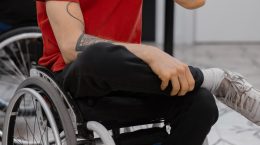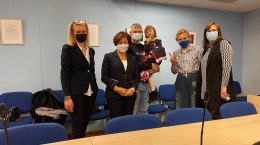The illegitimate president boasts that 76 years ago the USSR (and hence Belarus) won the Second World War. The horrors of those years constantly live with Belarusians – from school they tell us about what happened to our ancestors, the state-owned “Belarusfilm” makes war films, the newspapers write about the victory and remind us of how important it is to help veterans. However, in reality, those who suffered during the war years receive help at best once a year – by May 9th. On the eve of the holiday, we tell how the illegal government abandoned the elderly and how “Our House” helps them.
This year, for the holiday, pensioners were presented with another “gift” by canceling payments of bonus. Faced with the negativity on the Internet, the authorities got scared and still allocated money to the veterans. However, other problems of the elderly still fall on the shoulders of human rights defenders and caring citizens. On the occasion of the International Day for the Liberation of Nazi Concentration Camp Prisoners, we talked about how activists solve the problems of pensioners who have been children in death camps. Today, let’s complete the picture with information about what “Nash Dom” is doing to make life easier for veterans.
In January 2012, the activists gathered a round table dedicated to the problems of prisoners of the Vitebsk concentration camp “5th Regiment”. The pensioners shared with the Campaign “Nash Dom” what worries them: small pensions, lack of attention from the authorities – and also thanked them for their interest in the problems. We also discussed the release of the book “Children of War”.[1]
In the same year, the roof of a house in Slutsk where war and labour veterans lived began to leak. Activists of the Civil Campaign “Our House” helped to collect 60 signatures of the residents of the building and send a complaint to the deputy chairman of the district executive committee for housing and communal services and a deputy of the local district. The activists inspected the house – in each entrance on the upper floors they found numb ceilings in apartments and balconies black from dampness. The complaint indicated the requirements to create a commission for a detailed examination of the roof of the house and to include the house in the city plan for the repair of the roof.[2]
In 2013, “Our House” raised the issue of improving work with veterans. The military commissar rejected the activist’s proposal in writing to congratulate the veterans on the holidays of military glory. The military commissariat and the Tolochin regional executive committee did not participate in the funeral of the front-line soldier Nikolai Belanovich and did not publish an obituary in the newspaper about this. By the way, before his death, the veteran was admitted to the hospital only after the activist called the district authorities.[3]
In the winter of 2014, “Our House” wrote about a veteran – a front-line soldier from the village of RTS, near the agro-town of Kokhanovo, Tolochinsky District. On the New Year’s Eve, the pensioner received an invitation for another examination at a meeting of the medical and rehabilitation expert commission in Vitebsk. The veteran has been through thousands of kilometers of partisan forest, has several wounds, battle awards, and has the status of a group 1 invalid. It would be difficult for him to get to the regional center for a meeting.[4]
In spring 2020, “Our House” launched the #STOPparade campaign – in the midst of the coronavirus pandemic, Lukashenko wanted to go his own way and hold a parade with veterans, soldiers and plenty of spectators who would come to the “celebration” forced, for time off or under pressure from their bosses from work. The government demanded that everyone, including the elderly, for whom COVID-19 is especially dangerous, be without protective equipment. What is this if not the genocide of veterans? And the financial resources spent on the parade could be sent to support the elderly, build new schools, kindergartens and hospitals. Instead, Lukashenko chose to demonstrate to the whole world the strength of the Belarusian army and arrange a vanity fair for himself.
In the recently released monitoring of repression against pensioners, we also talked about those elderly people who were affected in one way or another by the war. 79-year-old resident of Minsk Larisa Sous, a disabled person of the 2nd group, survived the Holocaust. At the beginning of the war, she was three months old. Mom walked with her and her brother, who was 4 years old, from Minsk to the village, under fascist bombs. Her father fought and was wounded at Stalingrad. In 2020, Larisa Semyonovna took part in a peaceful protest. When the riot police ran out at the people with machine guns, the pensioner had no time to hide from them. She was thrown into a police van and she spent more than six hours in the police station.[5]
Sofia Minko was two years old at the start of the war. Now 81, she was fined for participating in the retirees’ march. She was charged under Part 1 of Article 23.34. According to the court, the woman deliberately violated the established procedure for the street procession. During the march, she had a white-red-white flag in her hands. Judge Dmitry Karsiuk ordered a fine of 270 rubles as a punishment. Moreover, Sofia Nikolaevna’s pension is 450 rubles.
We have described only a small part of the repressions against pensioners and front-line soldiers. I would very much like to give them respect and a dignified life in their old age. We wish all veterans, prisoners of Nazi concentration camps, all those who caught the war as children and were born during the war years good health, longevity, strength and vigour, and most importantly, respect from the people around them. We honor the fallen heroes and in memory of them we will do everything to free our country from the fascist rule of Lukashenko.
[1]https://nash-dom.info/19040
[3]https://nash-dom.info/23718







